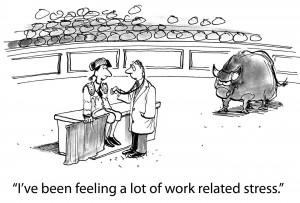Where People with MFT Degrees Work
 Graduates with a MFT (Marriage and Family Therapist) degree are highly-trained mental health professionals who bring a family-oriented perspective and treatment approach to health care related to mental, emotional, behavioral, and interpersonal disorders. Addressing a wide range of relationship issues that affect the family dynamic and communication between loved ones, a MFT also provides premarital-, relationship-, child-, separation-, and divorce counseling.
Graduates with a MFT (Marriage and Family Therapist) degree are highly-trained mental health professionals who bring a family-oriented perspective and treatment approach to health care related to mental, emotional, behavioral, and interpersonal disorders. Addressing a wide range of relationship issues that affect the family dynamic and communication between loved ones, a MFT also provides premarital-, relationship-, child-, separation-, and divorce counseling.
According to the American Association of Marriage and Family Therapy (AAMFT), marriage and family therapists see more than 6.1 million people on an annual basis. By 2031, the Bureau of Labor Statistics (BLS) predicts this occupation will grow by 14% – much faster than the average for all other occupations in the U.S. Read more about MFT careers.
MFT's typically work in the following places of employment:
1. Outpatient Care Centers
Outpatient care centers employ the third-most MFTs in the United States as of May 2022. Therapists are hired at outpatient care centers to treat children, adolescents, adults and seniors battling depression, substance abuse, or serious mental illness. Typical duties include providing various clinical services (such as leading therapy sessions), performing assessments, delivering patient and/or family education, case management, and acting as a liaison between patient units, outpatient and community providers, and physicians. Therapists also assist with the coordination and ease of patient discharge from inpatient programs to an outpatient setting.
2. Inpatient Care Facilities & Hospitals
Often working with a team of doctors, nurses and other healthcare personnel, people with a MFT degree are hired to work as inpatient therapists at healthcare facilities and hospitals. It is not uncommon to see hospitals with an entire floor or section devoted to mental health. An inpatient MFT usually takes on the role of case manager, and generally develops and follows through with a treatment plan for a patient in crisis who has been admitted on a short-term basis.
Hospitals also hire MFT's to provide therapy to families who are care providers for an elderly parent; married couples dealing with a terminal illness; and parents caring for a child with a chronic disease, such as diabetes or cancer.
3. Offices of Health Practitioners
According to the BLS, about 200,000 marriage and family therapists work in the offices of other health practitioners. This makes them the second biggest employer of MFTs in the nation as of 2022.
4. Schools
MFT's work at all levels of the school system – from treating families with troubled elementary school students to counseling parents on how to understand and cope with an out-of-control teenager.
A doctorate degree in marriage and family therapy entitles a professional to work in academia as an undergraduate or graduate professor, or researcher at a college or university. They may also train psychology students with an interest in marriage and family therapy, as well as educate them on how to conduct research or assume clinical work duties as a MFT. Graduates of a doctorate MFT degree program also qualify to become director of therapy programs at colleges and universities.
5. Social Service Agencies
MFT's are hired to work at government, non-profit, and for-profit agencies that provide social services to children, youth, families, seniors, and communities. Sometimes, marriage and family therapists are hired to take on administration roles, such as supervising other counselors and social service staff.
6. Private Practice
 It is not uncommon for marriage and family therapists to work out of a private practice – seeing patients and clients in an office setting during the day. Conducting individual, group, and family therapy sessions, MFT's may also split their time between private practice work, and providing counseling at other community locations, such as a social service agency.
It is not uncommon for marriage and family therapists to work out of a private practice – seeing patients and clients in an office setting during the day. Conducting individual, group, and family therapy sessions, MFT's may also split their time between private practice work, and providing counseling at other community locations, such as a social service agency.
Private practice therapy deals with a wide range of issues plaguing children, married couples and families, such as anxiety, grief, anger management, substance abuse, depression, and problems that affect job and school performance. These issues may originate out of the home, school, work or develop between specific relationships, and a MFT may spend months to several years treating the same clients.
MFT's can establish their own private practice, or join a team of therapists in private practice. Sometimes, a private practice can have a long-standing working relationship with local mental health and social service agencies, where they treat private-fee-only clientele based upon agency referrals.
7. Substance Abuse & Addiction Treatment Centers
Providing education about addiction, and assisting clients pinpoint the contributing factors that lead to the abuse of alcohol, drugs, food, gambling and other vices, marriage and family therapists find work in substance abuse and addiction treatment centers. Some MFTs address multiple addictions, while others choose to specialize in one area, such as the therapist who provides marriage counseling to couples dealing with sex addiction. Therapists are also hired to develop treatment plans, and help clients establish a healthy support system comprised of family and friends.
8. Medical Centers
From conducting psychosocial assessments to making resource referrals for patients in need of outpatient assistance, MFT's working at a medical center collaborate with other team members of a program to make sure a patient receives and maintains adequate treatment. They may provide both clinical and therapeutic services to patients on an individual basis and/or within a group setting.
9. Mental Health Centers
According to the BLS, professionals with a MFT degree are hired as mental health counselors at establishments that provide therapy to individuals, families, and groups, such as married couples dealing with drug addiction. They often counsel families dealing with severe mental illnesses and emotional disorders, such as schizophrenia, depression and anorexia/bulimia.
Providing therapeutic care, crisis intervention, and a serving as a link to other mental health programs and resources, MFT's deliver a wide range of mental health services to patients of all ages. The Behavioral Health Department of a county contracted children's clinic is an example of where a marriage and family therapist may work within the public mental health field.
10. Employee Assistance Programs (EAPs)
An Employee Assistance Program (EAP) is an employee benefit program that a company or business offers their workers as a way to help identify and ease personal problems or issues. These mental health programs are an effort to address and correct issues that may have a negative impact on an employee's overall health and wellbeing, quality of work, and job performance.
EAP services are paid for by the employer, and typically involve the contracting of a third-party company that manages the program. Marriage and family therapists are hired to provide short-term counseling, as well as refer employees and their family members to additional services they may need.
11. Nursing and Residential Care Facilities
Marriage and family therapists are hired by nursing homes and residential care facilities to diagnose and treat mental and emotional issues related to married couples and families. Oftentimes, a MFT will provide counseling related to coping with a spouse's or family member's illness.
12. Legal and Correctional Systems
 Assisting families and couples in legal crisis, a marriage and family therapist also works in law enforcement, legal, and the correctional system settings.
Assisting families and couples in legal crisis, a marriage and family therapist also works in law enforcement, legal, and the correctional system settings.
For instance, a MFT who works with the legal system is often called upon to make recommendations to courts regarding the outcome of child custody cases or visitation disputes. To make a fair determination, the therapist often contacts doctors, schools, social staff, juvenile counselors, and law enforcement personnel. It is also not uncommon to see a MFT testify in court.
In regards to correctional system work, a MFT can assume the role of counselor for families of spouses who are newly released from prison. Therapists may also hold therapy sessions for incarcerated individuals to address issues concerning their family ties or spouses before gaining reentry into society. Other cases may involve sexual abuse victims and perpetrators, as well as juvenile offenders, and mental health cases found in the criminal justice system.
13. Health Maintenance Organizations – HMO's
Health maintenance organizations provide or make managed care arrangements for health insurance, self-funded health care benefit plans, and individual patients. They work with a range of health care providers (such as hospitals and doctors) on a prepaid basis; and hire MFT's to treat clients. For example, Kaiser Permanente, the largest not-for-profit health maintenance organization in the U.S, hires marriage and family therapists to work in their related behavioral health centers; chemical dependency treatment programs; and mental health facilities.
14. The Government
MFT's are employed by the government to assume roles that can influence decision-making on a government and political level. For example, with a doctorate degree, a marriage and family therapist can conduct family research and public policy analysis from a family perspective, which can help shape future government programs and legislation. According to the BLS, MFTs working with the government are often some of the highest-paid professionals in the field. Local governments pay them a median salary of $84,500 while state governments offer a median wage of $79,110.
15. The Military
Marriage and family therapists are employed at clinical resource centers dedicated to assisting and supporting current service members, veterans, and their families. Often providing PTSD and TBI counseling to Active Duty, Reserve, and National Guard servicemen, MFT's typically complete additional credentials, coursework, training or experience assuming a role with the military, such as the Therapy with Military Families Specialization.
16. Department of Veterans Affairs (VA) Facilities
It wasn't too long ago that Marriage and Family Therapists were not eligible to be hired by the Department of Veterans Affairs to work as MFT's in VA facilities, but the Department has since expanded access to such mental health services. MFTs working in VA facilities conduct screenings and assessments; develop treatment plans and goals for patients; provide crisis intervention; and offer individual, conjoint, family and group therapy.
17. Churches and Religious Settings
Although they receive the same training as secular family therapists, MFT's who complete additional coursework in religion and counseling can become a faith-based therapy provider, such as a Christian family therapist. This kind of therapist provides counsel to married couples and families regarding mental health problems, relationship issues, and parenting concerns – all while following a treatment and counseling approach that falls in line with the Christian faith.
In conclusion, this is not an exhaustive list of all the places that people with MFT degrees can work, but aims to highlight some of the employment opportunities offering the highest number of available possibilities. From working as case managers for insurance companies to negotiating psychiatric care for employees of large corporations, the number of job positions that marriage and family therapy professionals qualifiy for continues to increase with experience, further training, and education.
2022 US Bureau of Labor Statistics job market trends and salary figures for marriage and family therapists are based on national data, not school-specific information. Conditions in your area may vary. Data accessed June 2023.














